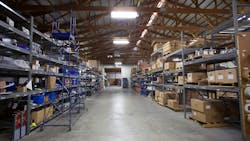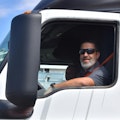Stocked and goated: Werts as busy ever 65 years after founding
Werts Welding & Tank Service hasn’t had this much trouble sourcing parts since Dwight Werts, the company’s long-time president and CEO, helped establish it as one of the first specialists in tank trailer parts distribution.
Long leads teams are common now—lasting up to a year, in some cases, he said.
But as challenging as that’s been for the family business, which recently celebrated its 65th anniversary, he feels worse for tank truck carriers.
“We have so many customers who need equipment and can’t get it,” said Dwight, 69, who’s approaching 30 years leading the Wood River, Illinois-headquartered company. “The supply chain is still broken.
“They can’t get drivers, they can’t get equipment, so it’s a struggle for them, too.”
Persistent, pandemic-induced disruptions are forcing fleets to run trailers longer, and prompting Werts to expand its supplier pool and parts inventory, and take on more complicated jobs at its maintenance facilities in Wood River, outside St. Louis, Missouri, and Birmingham, Alabama. “People are repairing trailers they normally wouldn’t because they can’t get new equipment,” Dwight said. “And with longer lead times for parts, if a trailer is involved in an accident, we have to be real creative to get it back on the road.”
The marginal cost of trucking grew by 12.7% in 2021, to a record $1.855 per mile, according to the American Transportation Research Institute’s 2022 Operational Costs of Trucking analysis, and a leading contributor to the increase was maintenance and repairs expenses—which soared by 18.2% year-over-year. Fortunately for tank fleet managers, Werts is well-equipped to keep their vehicles in service. The company Robert Werts, Dwight’s dad, founded in 1957 as a general welding shop now boasts two “R”-stamp, DOT-registered repair facilities, eight tank truck parts distribution centers across the U.S., and a tank trailer dealership.
“One of my grandfather’s sayings was, ‘You can’t sell from an empty wagon,’ so we keep as much inventory on the shelves as possible,” said Nick Wright, 34, Dwight’s son who currently serves in trailer sales.
“If we have to order more parts to keep them stocked, then that’s what we’ll do. We always strive to stock what the customer needs, when they need it.”
Roots in repairs
Welding is in Werts’ DNA. The company grew out of Robert’s love for the craft, and knack for fixing anything made of metal, typically farm equipment in the early days. Then a carrier who planned to load lube oil into a brand-new tank trailer at one of several nearby refineries ran into trouble, and turned to Robert for help. “They had flushed the lines with caustic, and somehow the lines got left full of it, and when the caustic got into the aluminum tank, it burned a whole in the bottom of the shell,” Dwight recounted.
“So they asked my dad if he could weld in a new bottom, and since he hadn’t done a lot of aluminum welding, he got into it, started practicing, and later they brought the tank in and he repaired it.”
One repair led to another, and Werts began specializing in tank trailer repairs in the 1960s. The family updated the company’s name to Werts Welding and Tank Repair in 1980 to reflect their expertise, which was reinforced by Dwight’s stint working with Ruan Transportation before returning to Werts in 1977. “I had experience operating equipment, so when drivers came in with a complaint about a trailer, or something not working right, I knew what they were talking about because of my time on the road,” Dwight said.
Werts established its second repair shop in Birmingham, Alabama, after the acquisition of Mid-South Tank in 1997. They moved the operation into a larger facility in 2001, and renovated the location to include five fully enclosed inside bays, four canopy bays, and two outside bays in 2019. Birmingham and the original Wood River shop now provide a range of code cargo tank repairs, along with annual and five-year inspections.
And the company’s shops are as busy as ever due to today’s equipment constraints.
“We’re fixing trailers that wouldn’t have been repaired if the manufacturing process was faster,” said Jeff Jones, Werts’ service director. “We’re putting new sub-frames under trailers that are 20 years old, and repairing insurance claims that previously would have been totaled because tank trailer values have doubled.”
A parts distributor apart
When the company started repairing tank trailers, they sourced parts straight from trailer manufacturers, or “petroleum equipment houses” that served gas stations. “We had to go through them, but they didn’t know what they were buying or selling us, because that wasn’t their line of business. So eventually we got the parts vendors to sell to us because we’re dedicated to the tank trailer business,” Dwight said.
Werts opened its first parts-specific distribution center in 1991 in San Antonio, Texas. It now boasts eight locations—including Wood River and Birmingham; Atlanta, Georgia; Tampa, Florida; Des Moines, Iowa; Billings, Montana; and Denver, Colorado—and averages more than 5,000 stocked parts ready to ship to its two shops, or anywhere else in the U.S. Bruce Cornelius, Werts’ parts manager, said 60% of their parts business—which is the company’s largest segment—is wholesale to independent shops, and 40% direct to fleets.
“Our shops and branches are able to pull from a multi-million-dollar inventory spread across all eight locations,” Cornelius said. “That’s a big advantage—and what sets us apart from our competitors.”
That advantage has only grown in the last few years. “We went from having most parts readily available to many being eight to 10 weeks out,” Jones said. “And other items that typically were a one- or two-week order are taking as long as a year. There’s no way to plan for that, but our eight locations and bulk buying power have helped.”
Cornelius said they try to treat suppliers how they want to be treated, realizing they have their own labor and supply-chain challenges. Still, some parts have been harder to come by post-pandemic. Hose has been scare at times, small parts like springs and gaskets are holding up larger assemblies, and brass and copper are in short supply. Fortunately, Werts’ inventory software is comprehensive, its parts knowledge is expansive—and its collection of old-school catalogs is incomparable.
Most new tank trailers have air-ride suspensions, but armed with the requisite knowledge and resources, Werts’ long-tenured employees—including Jeff Conroy, Jeff Downs, and Cindy Griffin—recently tracked down a dozen spring-suspension components for “parts units” returning to service. “We’ll go out of our way to find the most obscure stuff,” Cornelius said. “Our people remember it because they sold it.”
One-stop tank shop
Werts also sells new and used tank trailers. It has been a Heil Trailer dealer since 1991, and also represents Mac LTT, Mac Trailer, and Westmor Industries. “It’s been a good relationship builder for us because we provide repairs, parts, and trailers, so we’ve become a one-stop shop for a lot of our customers,” Nick said.
Werts’ most popular trailers are 9,500-gallon, four-compartment tankers for hauling petroleum products. The Westmors primarily are for propane and anhydrous ammonia, Nick said; and they sell Westmor’s Transtech tanks for straight trucks. Werts also provides custom upfitting services, and testing for new trailers. “Certain states don’t recognize testing from other states, as far as EPA stickers and vacuum tests,” Jones said.
Unfortunately for fleet managers, new trailers are easier ordered than received. Werts started placing orders for 2024 late last year.
“Our phone has been ringing off the hook,” Nick said. “We’ve had to plan for our customers the last couple years, and help them look ahead. So we stay in close contact with them on what they think they will be doing in the future, because a lot of times they can’t make a decision while awaiting budget approval, but they can give us a feeling for what they’re going to need, and we can play off that.”
All are in the family
They do it because they care—and companies care more when it’s their family’s surname on the business, Nick insisted.
That’s why Dwight keeps putting off a well-earned retirement.
“I have a lot of employees who’ve worked with me for a long time, and I don’t want to leave them,” Dwight said. “We ran the numbers a while back, and our average tenure, even for new hires, is 12 years, which is unheard of in today’s environment.”
Werts’ 98 employees stay because they’re treated well. Mechanics have the latest safety equipment, including comfortable new safety harnesses from 3M and confined-space gas detectors from RKI Instruments, and everyone is treated to free breakfasts weekly, including sausage biscuits on Wednesdays and doughnuts on Fridays.
“I always tell people not to judge us solely on pay, because happiness and job satisfaction go a long way—and Werts treats its employees like family. “You’re paid well, don’t get me wrong, but it’s the atmosphere that sets us apart.” Nick, who will succeed Dwight, agrees, and is determined to keep it that way. He’s already preparing the fourth generation—daughter Natalie, who’s 13, and son Hunter, who’s 6.
“I’d love to see it go another 65 years,” he said. “I’m definitely planning on it, and if my kids decide to join me one day, I’ll appreciate it.”
About the Author
Jason McDaniel
Jason McDaniel, based in the Houston TX area, has more than 20 years of experience as an award-winning journalist. He spent 15 writing and editing for daily newspapers, including the Houston Chronicle, and began covering the commercial vehicle industry in 2018. He was named editor of Bulk Transporter and Refrigerated Transporter magazines in July 2020.

